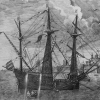The Art of Compromise: Legislative Deliberations on Marine Insurance Institutions in Antwerp (c. 1550-c. 1570)
DOI:
https://doi.org/10.18352/bmgn-lchr.10102Keywords:
Legal history, Merchants, Commercial relations, ShippingAbstract
Dave de Ruysscher and Jeroen Puttevils look into the complex interaction – typicalof the Low Countries – between various stakeholders (economic agents, citygovernment and central government) that shaped the legislation of economic practices. Eschewing top-down (the central government imposes its rules) and bottom-up (merchants sought to have their customs legalised) models, and taking into account the powers enjoyed by city governments in the Low Countries, which were both ample but also constrained by the central government, the authors trace the development of one particular type of contract and transaction – sixteenth century marine insurance, a growing sector for which Antwerp became the key centre. By laying bare the negotiation process which preceded the compromise, they find that decisions on the legislation regarding marine insurance were both politically and economically induced. The three major agents (merchants, city government and central government) were not monolithic blocs: within the Antwerp mercantile community different opinions on marine insurance and its legislation could be heard. There were ‘national’ differences and small-time insurance purchasers thought differently about state legislation than their larger colleagues and insurers. Parties with political clout also had a stronger voice in negotiations.
De kunst van het compromis. Onderhandelingen over wetgeving voor het
zeeverzekeringswezen in Antwerpen (c. 1550-c. 1570)
De wetgeving rond economische praktijken in de zestiende-eeuwse Nederlanden werd in belangrijke mate bepaald door de complexe interactie tussen verschillende belangengroepen (economische agenten, stedelijke overheid en centraal gezag). Dave de Ruysscher en Jeroen Puttevils zijn van mening dat top-down (de vorst legt zijn regels op) en bottum-up modellen (kooplieden willen hun gewoonten omgezet zien in wetten) weinig afdoend zijn en stellen zich vragen bij de reikwijdte van de macht van stedelijke overheden. Door op zeeverzekering te focussen, een praktijk die sterk groeide in de zestiende eeuw en waarvoor Antwerpen een belangrijk centrum werd, wordt het onderhandelingsproces en het zoeken naar een compromis tussen de verschillende belangengroepen duidelijk. De beslissingen over wetgeving waren daardoor het resultaat van zowel politieke als economische dynamieken. De verschillende belangengroepen werden door interne spanningen gekenmerkt: zo verschilden Antwerpse handelaars qua participatie in de zeeverzekeringssector, ‘nationaliteit’ en contacten met de politieke machthebbers.
Downloads

Published
Issue
Section
License
Authors who publish with this journal agree to the following terms:
a) Authors retain copyright and grant the journal right of first publication with the work simultaneously licensed under a Creative Commons Attribution 4.0 International (CC BY 4.0) that allows others to share the work with an acknowledgement of the work's authorship and initial publication in this journal.
b) Authors are able to enter into separate, additional contractual arrangements for the non-exclusive distribution of the journal's published version of the work (e.g., post it to an institutional repository or publish it in a book), with an acknowledgement of its initial publication in this journal.
c) Authors are permitted to post their work online (e.g., in institutional repositories or on their website) prior to and during the submission process.
Authors are explicitly encouraged to deposit their published article in their institutional repository.











